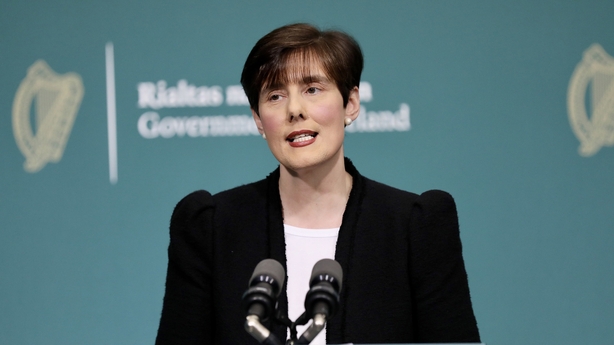Schoolbook sellers have appealed to schools to consider using their local bookshop when sourcing books under the State's free schoolbooks scheme.
Speaking as the Minister for Education Norma Foley gave further detail of the expansion of the scheme to include Junior Cycle students in most schools from this September, their representative organisation has expressed concern that the move could lead to shop closures.
The representative group, Bookselling Ireland, said it welcomed any initiative which eased the financial burden on parents, but it said that seven local bookshops had closed between October and December of last year and all of them had cited the primary school free books scheme as a factor in their decision.
Earlier, Ms Foley issued further details of the Government plan to provide free schoolbooks for all Junior Cycle students from this coming September.
The scheme was announced last year as part of the budget.
Minister Foley said that schoolbooks and core classroom resources such as journals, copybooks, dictionaries and calculators will all be provided for all students in Junior Cycle years in schools that are part of the Free Education Scheme.
She said that there will be no need for parents or guardians to buy or rent these items.

Schoolbooks will be the property of the school and must be returned at the end of the school year or the Junior Cycle.
The minister said a special administrative support grant would be provided to schools this year to help them with the roll out of the scheme.
This will be tailored according to the size of the school. For example, in a 400 student school a teacher will be freed up for 13 days to enable them to administer the scheme, with cover for the period paid for by the department.
The provision of free school books at Junior Cycle is expected to cost €68 million this year, the first year of the programme. The minister said funding would be reviewed in subsequent years.
The scheme does not apply to fee-charging schools and digital devices such as e-books are not included.
210,000 students will be able to avail of free school books under the new programme.
The minister said it reflected the Government's "absolute determination to ensure that costs for parents were reduced, where we can do it".
'More bookshop closures are inevitable'
Bookselling Ireland, run by a committee of booksellers, said that in the initial rollout of the primary school scheme it was widely and erroneously believed that schools were obliged to accept the lowest quotation when selecting a supplier.
The organisation has pointed out that the guidelines do not state this, and it has called on the Department of Education to clarify that there are a range of considerations that schools should take into account, such as supporting local businesses, quality of service provided and sustainability.
In a statement, it said bookshops had years of experience supplying schoolbooks for their local schools.
"They understand the complexities of the various Junior Cycle subjects and their levels, are familiar with school booklists, and have existing relationships with schools," the organisation said.
It said margins on schoolbooks are very slim for bookshops, "but the increase in footfall brought by schoolbook sales during the summer months made it worthwhile".
"With this footfall removed, more bookshop closures are inevitable," it added.
Bookselling Ireland has called on the Government to introduce specific targeted supports that recognise the cultural impact and importance of physical bookshops.
These include the introduction of cultural vouchers, such as those used in other EU countries, to encourage young people to visit bookshops.
Committee Chair Dawn Behan said booksellers were appealing to the Government representatives to "act swiftly to stem the flow of bookshop closures before it is too late."







